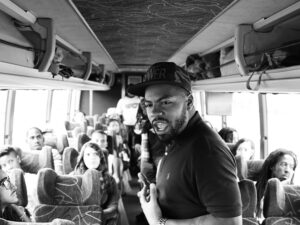
To be Black in America is to live in two worlds at once.
In one world you’re told if you work hard and do the right thing, you can grow up and have anything you want. In another world you witness that dream being snatched out of the hands of Black children, men and women. The is the world Trayvon Martin lived in on Feb. 26, 2012, where in the blink of an eye a dream became a nightmare.
Never before on a national level had I witnessed such a heinous atrocity transpire to a young, Black boy. For many Black children growing up in America, this tragedy provoked doubt in the legitimacy of the value of “justice” we are often taught to believe is a right every American citizen is entitled to. To add to our already wavering faith in our justice system, the not-guilty verdict delivered to the murderer, who deservedly will remain unnamed, completely woke up a young generation to the reality of being Black in America.
Prior to the murder of Trayvon, it was only through very limited history lessons that most Black youth learned how white supremacy had robbed individuals of the right to dream. Through learning about the assassination of historical figures like Dr. Martin Luther King Jr. and the brutal lynching of 14-year-old Emmett Till, young “millennials” and “zoomers” were given a meager inside look into the dark history of our nation.
With the death of Trayvon and the trial, constant news coverage and dialogue on social media allowed young Americans to voice the anguish they were feeling, living through this tragedy unfolding in real time. The injustice left our generation with two options: Press on or remain silent.
For Jabari Capers, a graduating engineering student at Florida Agricultural and Mechanical University, the option to press on was more like a necessity than a choice. Capers is Martin’s cousin, although more like brothers having spent many of their summer days playing Call of Duty and football under their grandmother’s roof.
“Really until the shooting happened that’s when I was like, ‘OK wait, so a lot of things don’t make sense anymore,’” Capers said. “Like things already didn’t make quite a lot of sense but after that I was like OK …”
Much like Capers, a lot of young, Black Americans were trying to process their confusion, with what we believed was an obvious abuse of power. A racial divide among us and our peers truly broke out when many White youth were blind to the racial aspect of the case, meanwhile Black youth saw the situation for what it really was.
The Pew Research Center conducted a study in 2013 on the racial divide of the verdict of the case. Fifty-two percent of White individuals ages 18-29 believed that the issue of race was getting too much attention in the case. Meanwhile 78 percent of Black individuals believed that race was an important issue that needed to be discussed in the case.
Since the death of Trayvon Martin, Black individuals have worked hard to ensure that his killing was not in vain. Dr. King spoke on the importance of how we respond to suffering in his speech “Suffering and Faith.”
“As my sufferings mounted I soon realized that there were two ways in which I could respond to my situation — either to react with bitterness or seek to transform the suffering into a creative force. I decided to follow the latter course,” King said.
Following the death of Trayvon Martin, young Black citizens’ involvement in organizing and activism surged. Shortly after Martin’s death gained media attention, FAMU alumni Phillip Agnew helped form the Dream Defenders and led Florida college students in rallies and protests. Agnew’s leadership is just one example of how Black people have transformed the suffering into a “creative force.”
As a community we still have a ways to go in transforming our suffering, but Capers is pleased with how we have continued to fight for Martin and others like him.
“I definitely think it’s [activism in 2020] doing it justice,” Capers said. “I think the only time it doesn’t do justice is when people try to use it as a tool… for their own personal gain. When it starts becoming less about the cause and less about us and when it becomes ‘Well how can I bring attention to me?’”
The legacy of Trayvon Martin’s life and death eight years later still resonates with many Black individuals. We will continue to fight until justice isn’t just a dream but a reality for all Americans.